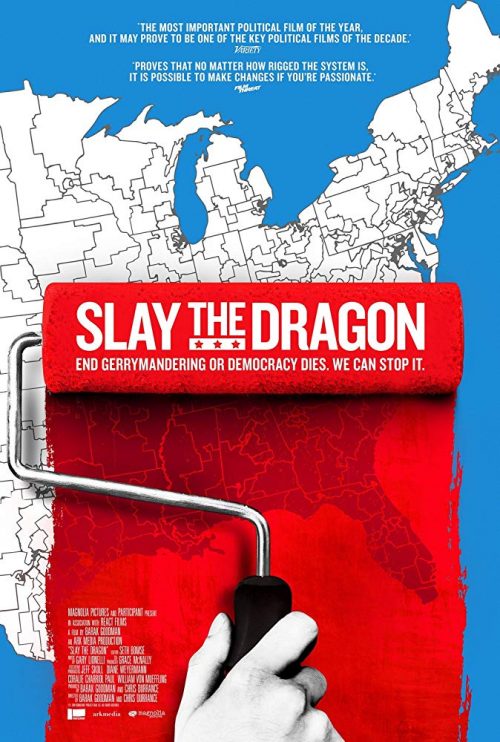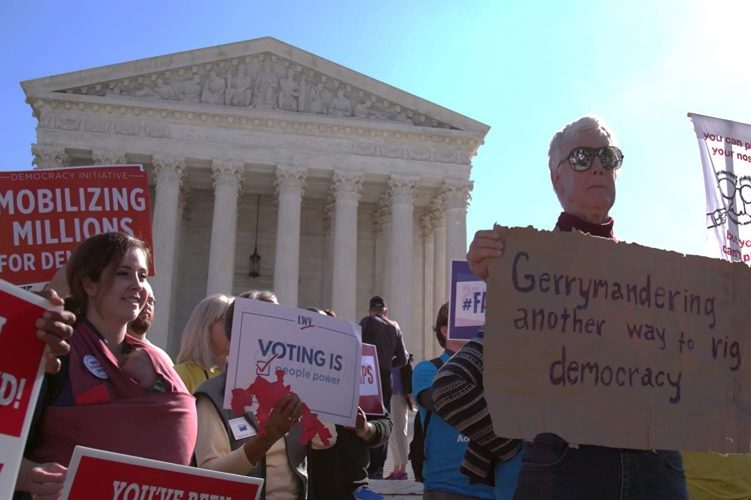The new film, Slay the Dragon, from directors Chris Durrance and Barak Goodman, may prove to be one of the more pivotal, and possibly important films of the year when all is said and done. The film is a mediation and analysis of the political process and effects of gerrymandering—the practice of creating boundaries for electoral districts that ostensibly favor certain political interests within legislative bodies. The triumph of Slay the Dragon though is that this never comes across as dry or dull, rather the film is a thoroughly engaging and thought-provoking analysis of a process that may slowly be eroding the American Democratic ideology.

The film essentially illustrates the history of gerrymandering and how it has become more widespread and dangerous in recent times. After the 2008 election, a secretive, well-funded partisan initiative poured money into state legislative races in key swing states to gain control of their redistricting processes and used high-tech analytics to dramatically skew voting maps based on demographic data. This resulted in one of the greatest electoral manipulations in American history. While the practice of gerrymandering has been around for centuries, today’s hyper-partisan political environment has taken the concept to dangerous extremes, which are evident in the film’s showcasing of the 2018 midterm elections. But many voters, tired of political parties manipulating the system to remain in power, or usurp power from the party chosen by the people, have begun anti-gerrymandering initiatives across the country that look to bear fruit in the near future and fix a broken system before the American ideal of democracy is destroyed forever.
While there is a lot to digest in Slay the Dragon, it’s admirable how Durrance and Goodman’s film present the concepts and practices at work here in a tangible and remarkably easy to comprehend manner that demystifies the practice and makes it all the more abhorrent at the same time. The process is laid out via the example of the city of Flint, Michigan, which was subject to a monumental health disaster after switching the city’s water source and contaminating the water supply with lead. The city is then appointed an emergency manager by the state’s Republican governor who was then granted authoritarian-like powers by a Republican-led state legislature.

Although the idea of film exploring the practice of gerrymandering may seem like a vehicle for a diatribe about political leanings and ideology, Slay the Dragon proves more interested in preserving the sanctity of the American democratic process than stating the worth of one party over another. This point of view, coupled with the story of a “David”-type political movement taking on the “Goliath” of gerrymandering, process that democracy still has those that support and believe in it enough to fight for it and that is inspiring in itself.

| Producer: | Dorin Razam-Grunfeld |
| Release Date: | April 3, 2020 via Video-on-Demand (VOD) |
| Running Time: | 101 minutes |
| Starring: | (As themselves) Ari Berman, David Daley, Margaret Dickson, Anita Earls, Katie Fahey, Ruth Greenwood, Chris Jankowski, Justin Levitt, Vann Newkirk, Dale Schultz, Nick Stephanopoulos, Chris Taylor, Stephen Wolf |
| User Rating: | |
| MPAA Rating: | PG-13 |
| Director: | Chris Durrance, Barak Goodman |
| Distributor: | Magnolia Pictures |
| External Info: | Official Site |
